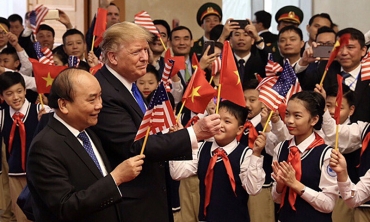Twenty-five years after the two countries reopened diplomatic relations, which were established on July 11, 1995, Vietnam is now an important partner of the United States in the Asia-Pacific region. Vietnam offered the United States a stable, prosperous, and independent partner in Southeast Asia that contributes to international peace and security and supports the rule of law in the Indo-Pacific, as well as the rules of the global trading system. On the occasion of the anniversary of the bilateral relationship, Consul General Mary Damour said all these things contribute to the security of the United States.
Damour itself added that the relations between the two countries would not have faced any setbacks in the event of a change in the White House, as Democrats and Republicans agree to consider Vietnam as a strategic partner. Of course, this does not depend on the fact that the United States has suddenly decided to support a one-party socialist state, but rather on what is appropriate To be able to consider a country that has territorial disputes with China a “friend.”
In these 25 years – it must be said – the relationship between the United States and Vietnam has also led to interesting cooperation projects, such as the Reclamation of Vietnamese lands from unexploded ordnance He was buried after the long and bloody war waged by the United States and the puppet government of South Vietnam until 1975. And recently signed the USADA (United States Development Agency) An agreement with the state-owned Vietnam Electricity Corporation (Evn) to support the installation of solar panels in the Asian country.
In a rapidly growing country like Vietnam, electricity demand is growing 10% annually, which makes it necessary Switching to renewable and clean energies, in order to avoid increasing the rate of air pollution, Really quite high as far as the capital, Hà Nội and H Chí Minh City. The country has already made significant progress in this sense, and the agreement with the United States Agency for International Development (USADA) should presumably allow the way forward: In September 2019, Vietnam managed to produce 25,000 megawatts of power through solar energy, far exceeding the 4,000 megawatt target which Specified by the government. Currently , Renewable energies account for 9% of Vietnamese energy production, Exceeding the target of 7% for 2020.
However, relations between the United States and Vietnam were affected as well setback. On December 16, the US State Department announced sanctions against the Vietnam Gas and Chemicals Transport Company for “knowingly committing, as of November 5, 2018, a major deal to transport petroleum products from Iran.” Vietnam responded by affirming its right to establish economic and trade relations with any other country in the international community without having to submit to the assumptions of third parties: “Relations between Vietnam and Iran have always been open, transparent and legal,” the spokesman said. Foreign Office, Lê Thị Thu Hằ. The government of Vietnam called for the lifting of the sanctions imposed by the United States, noting that they are subject only to United Nations resolutions, which prohibit trade with Iran only for war materials.
Vietnam wants to prove to the United States that it is a An independent country with its own foreign policyWhatever the good relations with Washington. Government Hà Nội is unwilling to submit to orders from North AmericaEspecially at this time when China is assuming an increasing leadership role in the Asia-Pacific region, while the United States is gradually losing its power.
To prove this, on The Beijing RCEP Initiative was signed (Regional Global Economic Partnership), which includes, in addition to China, four historic allies of the United States (South Korea, Japan, Australia and New Zealand) and all ten ASEAN countries (the Association of Southeast Asian Nations), including Vietnam, which hosted the virtual summit in which it took place. Signing the agreement, on November 15th. According to HSBC economists, the agreement “could reinforce a trend that has already been in place for decades: that the global economic center of gravity continues to move relentlessly eastward.”
This agreement, which includes countries where 45% of the world’s population live and which are at the center of 40% of global trade, clearly articulates how the United States is losing control of what is considered the most geopolitically important region. From the twenty-first century. Of course, countries like South Korea, Japan, Australia, and New Zealand will still be firmly attached to the United States, but only until recently did they consider signing such an agreement with China a taboo. They clearly understood that the time of the American Empire was running out, and carefully considered covering their backs in light of the ultimate end to the domination of stars and stripes.
12/26/2020 | Copyleft © All material is freely reproducible and only the source is required.
Credits: VN Express / Ngoc Thanh

Communicator. Reader. Hipster-friendly introvert. General zombie specialist. Tv trailblazer

